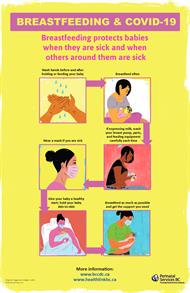 Breastfeeding and skin-to-skin contact is recommended during the COVID-19 pandemic. Human milk has antibodies and immune factors that protect the health of your baby. Wash your hands before and after providing care, holding or feeding your baby, and wear a mask if you are sick.
Breastfeeding and skin-to-skin contact is recommended during the COVID-19 pandemic. Human milk has antibodies and immune factors that protect the health of your baby. Wash your hands before and after providing care, holding or feeding your baby, and wear a mask if you are sick.
If temporary separation from your baby is required, you are encouraged to express your milk. You may reuse your breast pump kit as long as you wash your breast pump, parts, and feeding equipment carefully each time.
For more info on expressing milk and cleaning your breast pump visit: Expressing breast milk
BCCDC COVID-19 Guidelines for breastfeeding

